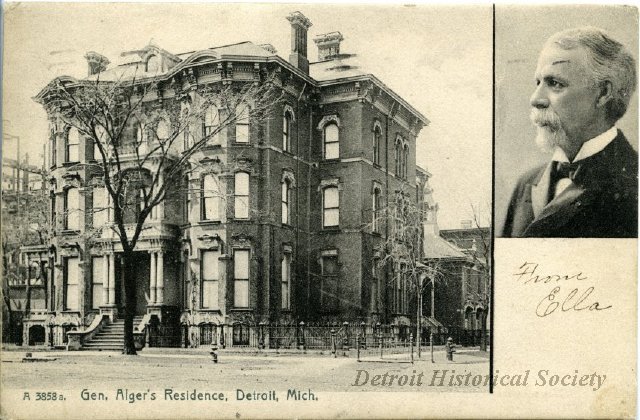Michigan governor Russell Alexander Alger was born in Medina County, Ohio on February 27, 1836. Alger was orphaned at the age of 11 and was forced to support himself and his younger brother and sister. He worked on a farm to make ends meet, and attended school at Richfield Academy. Alger studied law and was admitted to the Ohio bar in March 1859. He moved to Grand Rapids, Michigan in December of that year, just before the Civil War.
In Grand Rapids, Alger met his future wife, Annette H. Henry. They married on April 2, 1861; six of their nine children lived to adulthood. On September 1, 1861 Alger enlisted in the Union Army, the 2nd Michigan Cavalry, as a private. He quickly rose through the ranks, becoming a major general by the time of his retirement in 1864. As commander-in-chief of the Grand Army of the Republic veterans’ association, a position to which he was elected in 1889, he was able to help make improvements in Civil War pensions.
After the war, Alger moved to Detroit where he started a successful business in the logging industry. He became head of R.A. Alger & Co., president of Manistique Lumber Company, and a director of the Peninsular Car Company and the Detroit National Bank.
Alger successfully ran for governor on the Republican ticket in 1884. His election ended the two-year reign of the Greenback Party in Michigan. During his one term in office, Alger formed a soldier’s home, a pardon board and a state mining school along with passing legislation to help regulate the Lake Superior ship canal.
In 1897 Alger was appointed to President William McKinley’s cabinet as Secretary of War. In this role, he oversaw the U.S. military operations during the Spanish-American War, a job for which he received much criticism. Alger ultimately resigned from the post and returned to Michigan.
But Russell A. Alger was not yet done with politics. When U.S. Senator James McMillan died in 1902, the governor of Michigan appointed Alger to complete his term. He remained a senator until he died on January 24, 1907. He is buried in Elmwood Cemetery in Detroit. A fountain on the east side of Grand Circus Park honors his memory and a Michigan county bears his name.
